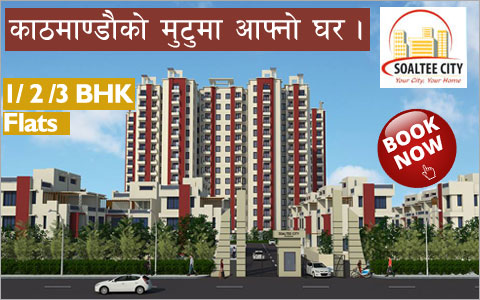National News

Nepal Rastra Bank (NRB) has raised the ceiling for personal home loans to Rs 15 million.
Earlier, the ceiling for personal home loans was Rs 10 million.
The central bank raised the ceiling in line with the demand of the bank and financial institutions (BFIs). Earlier, banking executives had requested the NRB to make upward revision in the personal home loans ceiling, arguing that cost of land and construction materials has increased in recent years.
As the ceiling for personal housing loans is Rs 10 million at present, bank and financial institution (BFIs) extending loans higher than the limit have to count the exceeding amount into another loan category like commercial complex loan.
Banks are required to put less risk weight on personal home loans while such risk weight requirement is higher in other category. This implies that lenders are required to set aside less capital in personal home loans while higher capital has to be allocated if housing loan is sanctioned through other category like overdraft, commercial or real estate loans.
Consumers borrowing higher than Rs 10 million are more likely to pay higher rates as BFIs used to pass on the additional cost of loans when changed in other categories on borrowers.
Meanwhile, the NRB has also tightened lending on real estate sector in Kathmandu Valley by reducing the loan to value (LTV) ratio going on such sector. According to the new policy, lending to real estate category in the valley has been reduced to 40 percent from the existing ratio of 50 percent. With the new LTV ratio, real estate sector will get lesser funds against property pledged as collateral.
However, the LTV on real estate lending outside the valley has been kept unchanged at 50 percent. “This provision is expected to encourage decentralized development in the spirit of federalism,” NRB Governor Chiranjibi Nepal said, while unveiling the Monetary Policy for Fiscal Year 2017/18.
Cars now available at 35% down payment
NRB has offered some relaxation for those looking to buy personal vehicles through bank financing.
In the Monetary Policy for Fiscal Year 2017/18, the central bank has increased the maximum amount that a bank or financial institution can finance for purchase of personal motor vehicles.
The loosening of the restriction enforced through the mid-term review of the monetary policy of the current fiscal year 2016/17 means people looking to buy personal cars can get one by making a down payment of only 35 percent. Rest of the cost can be financed through bank loans.
According to the new monetary policy which will come into effect from mid-July, BFIs can now offer loans of up to 65 percent of the valuation of the motor vehicle compared to the existing financing ceiling of 50 percent. Lending limit for electric cars has been set at 80 percent.
Through the mid-term review of the monetary policy of the current fiscal year, the NRB has reduced the ceiling of loans that the BFIs can finance on purchase of motor vehicles to 50 percent in the wake of credit crunch problem due to 'aggressive lending' BFIs on less productive sectors like automobiles, real estate and stock market.
Before the mid-term review, the BFIs used to finance up to 90 percent of the valuation of the car.
The relaxation comes in the wake of strong lobby from automobile dealers who said that tightening of the ceiling has caused demand for cars to fall.
They were also arguing that the tightening of lending limit has also affected revenue collection.
source: republica, 10 July 2017
- 9th Nepal Buildcon International Expo 2024
- Real Estate Expo 2023
- NRB raises housing loan limit to encourage home constructions
- Nepal Rastra Bank (NRB) Monetary Policy 2080-2081
- New Price of Land in Kathmandu Metropolitan City, Nepal
- Capital Gains Tax Rate on Real Estate Transactions in Nepal 2080-81 ( 2023/24 )
- Kathmandu metropolis implements free parking policy for commercial buildings and hospitals

![[X]](https://www.housingnepal.com/images/popup-close-button.png)










































































































































































































































































































































































































 Facebook
Facebook
 Delicious
Delicious
 Digg
Digg
 Reddit
Reddit
 Stumble Upon
Stumble Upon









